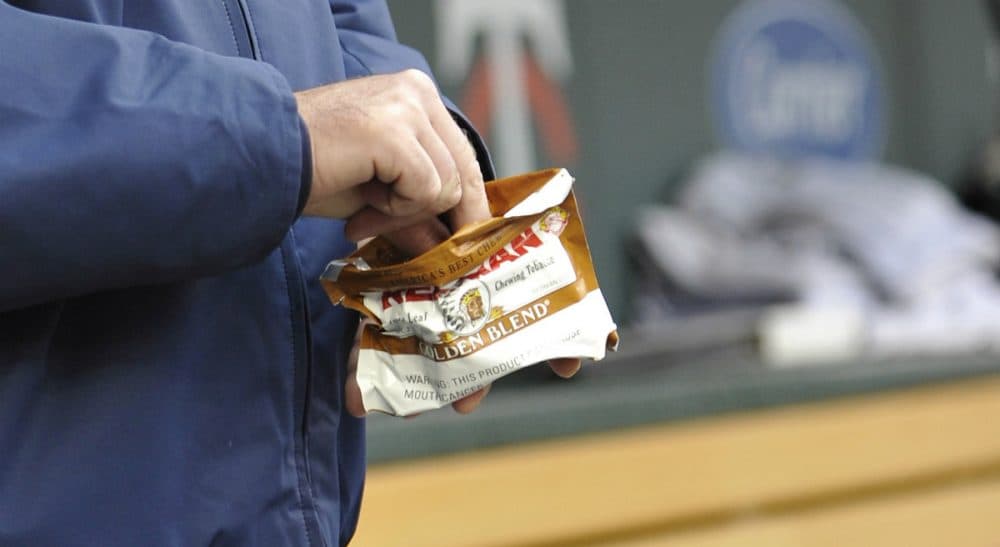Advertisement
Long Live The Nanny State! (Without It, You Might Be Eating Horse Meat Right Now)

The ban on chewing tobacco that took effect at Fenway Park this week riled up some freedom fighters, who fumed at big government’s impingement on their God-given right to spew streams of addictive brown juice through their teeth.
Boston joined ballparks in New York and San Francisco in forbidding patrons and even superstar athletes from chewing on wads of tobacco stuffed into their cheeks, on the not unreasonable grounds that it causes cancer, tooth decay, gum disease and general grossness.
Still, the ban was derided as “prohibitionist nonsense,” “nanny-state over-reach” and “another moralistic crusade by an army of overpaid, useless babysitters,” to sample just a few citizen comments.
By banning smokeless tobacco in Boston's sports venues, we're on our way towards becoming a healthier City. Read more http://t.co/jhM1PZwaNp
— Mayor Marty Walsh (@marty_walsh) September 9, 2015
I suspect the furor will soon recede, as Sox fans focus more on the team’s pitching than on its spitting. Anyway, the smokeless tobacco ban is but a trifle when compared to prohibitions adopted elsewhere in this great land. Plastic bags, leaf blowers, pit bulldogs and Styrofoam cups have been banned in communities from Cambridge to Chicago. Last month a New Jersey legislator filed a bill that would ban texting while walking. Snohomish County, Washington, has banned the consumption of horse meat. Several towns in California have outlawed sleeping in cars.
Despite claims that nanny-state no-nos are all a liberal conspiracy, bans respect no political ideology. Liberals do tend to aim at hazards to health or the environment: sugary soft drinks and plastic water bottles. But conservative communities also have favored targets. Earlier this year the Alabama Legislature adopted a law barring individual cities from raising the minimum wage. Oklahoma banned any community from passing local ordinances to ban fracking: an anti-ban ban. Of course, the United States has a long history of banning books, from "Huckleberry Finn" to "Fahrenheit 451" (a book about banning books!). And don’t get me started on same-sex marriage.
I tend to side with community prohibitions on unhealthy, intrusive, or noxious behavior ... But I have my own line to draw when it comes to free speech.
Government restrictions on personal behavior only get more onerous — and more ridiculous — as we move overseas. In 2012, the Indian town of Sunderbari banned unmarried women from using cellphones, lest they be arranging trysts. Citing its anti-pornography laws, Indonesia attempted to bar women from wearing miniskirts in cities. So-called laughing yoga was outlawed in Mumbai. In the Cambodian capital of Phnom Penh, the public roasting of cows was banned so as not to offend some Buddhist monks. Hamburg, Germany recently banned individual “K-cups” for dispensing coffee, finding them to cause "unnecessary resource consumption and waste generation." In the English seaside town of Weston-super-Mare, one of those commercial inflatable bendy men was barred for being “garish.’’
I tend to side with community prohibitions on unhealthy, intrusive or noxious behavior (jet skis, anyone?), since we all need to walk on this planet together. But I have my own line to draw when it comes to free speech. I get twitchy about government deciding what words are allowed and which are offensive, and that includes in public universities and the most hateful websites. Those of us who revere the First Amendment find it increasingly difficult to oppose censorship when popular culture has become so indecent and the public dialog so coarse. Still, we’re better off hearing the vitriol so we know where people stand.
For many Americans, what grates most about bans is the government deciding it knows better than we do what is good for us.
But maybe it does. A massive new study published in the Journal of the American Medical Association this week found that life expectancies were longer, especially for the poor, in communities that promoted healthful policies such as aggressive regulation of smoking or trans fats. New York City had the best outcomes, followed by six cities in ban-happy California. For the poor, life expectancies were six years longer in New York City than for people with the same income in Detroit. So maybe the nanny state has its place. After all, even in the Declaration of Independence, “life” comes before “liberty.”
